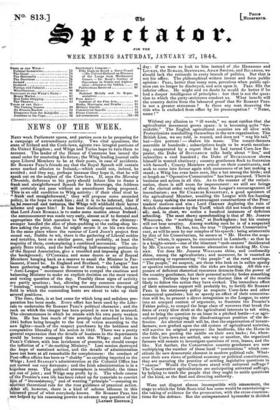NEWS OF THE WEEK.
NEXT week Parliament opens, and parties seem to be preparing for a campaign of extraordinary activity. Two vital questions, the state of Ireland and the Corn-laws, agitate two integral portions of the United Kingdom ; and Whigs and Tories hope to turn them to account. The leader of the House of Commons has issued the usual order for mustering his forces; the Whig leading journal calls upon Liberal Members to be at their posts, in case of accidents. Sir, ROBERT PEEL'S friends say that the Royal Speech will contain some marked allusion to Ireland,—which could not, indeed, be avoided ; and they say, perhaps because they hope it, that he will speak out on the subject of the Corn-laws. If, says the Morning Chronicle, deference to his party should induce him to frame a frank and straightforward Speech for his Sovereign, the Address will certainly not pass without an amendment being proposed. This is an odd condition to Whig activity : if their chief rival be " frank and straightforward," they. will .propose some amended policy, in the hope to crush him ; and it is to be inferred, that if be be reserved and tortuous, the Whigs will withhold their better scheme and spare him ! It has been distinctly asserted, indeed, that Lord JOHN RUSSELL is to make some _motion about Ireland : the, annouucement was made very early, almost as if to forestal and appropriate the Irish question to Whig uses,—as the chimney- sweeper handled the slice of plum-pudding at the eating-shop be- fore asking the price, that he might secure it on his own terms. In the same place where the rumour of Lord JOHN'S project first oozed out, Dublin to wit, there is the gathering of Liberal nobles and notables, bent, on a similar game, and probably, at least the majority of them, contemplating a combined movement. The un- gainly State trials, and the half-wailing half-menacing pertinacity of the Repeal Association, give a troubled and imposing gloom to the background; O'CONNELL and some dozen or so of Repeal Members hanging back as a reserve to assail the Minister in Par- liament, if need be. In England and Scotland, " the League" has been gathering suffrages in favour of free trade; while the new " Anti-League " movement threatens to compel the cautious and balancing Minister to make an explicit decision on the most vexed and vexing question of the day. Possibly these signs of activity are partly spurious ; but, allowing for any common amount of " humbug," enough remains to give unusual interest to the opening field in which the contending hosts are about to take up their several positions. The time, then, is at last come for which long and sedulous pre- paration has been made. Every effort has been used by the Libe- rals to undermine Sir ROBERT PEEL'S political character ; and the rock on which the vinegar has been poured is now to be stormed. The circumstances in which he stands with his own party weaken him. He has lost much of the prestige that attached to him in 1841 before being brought to the test of action according to the new lights—much of the respect purchasea by the boldness and comparative liberality of his action in 1842. There was a pretty general expectation that the details of business in the departments would be better managed than with the Whigs ; and that in REEL'S Cabinet, with less lavishness of promise, we should escape the infliction of a " do-nothing Ministry.' Last session destroyed the hope of sustained action, and the details of administration have not been at all remarkable for completeness : the conduct of Post-office affairs has been as " shabby " as anything imputed to the Whigs ; Lord STANLEY'S administration at the Colonial Office has not turned out very fortunate ; and the Irish administration is in a hopeless mess. The political atmosphere is troubled; the times are out of joint ; and Whigs may profit by it. The whole course of the Premier's own life has been raked up for materials to convict Km of "inconsistency," and of wanting " principle "—meaning an abstract theoretical rule for the true guidance- of practical action. After all, ,however, there is a kind of solemn idleness in this laboured proof of what everybody knows. Sir ROBERT PEEL has _ not-helped by his reasoning powers to advance any question of the (Lauer EDITION.] day: if we were to look to him instead of the HOBBESES and LOCKES, the BURKES, BENTLIAMS, ADAM SMITHS, and RICARDOS, we should lack the rationale in every branch of politics. But that is not his office. The philosophical writers invent and form public opinion : PEEL, better than many men, perceives when public opi- nion can no longer be disobeyed, and acts upon it. PEEL fills the inferior office. He might and no doubt he would do better if he had a deeper intelligence of principles : but that is not the ques- tion to which the party-strictures conduct us. What benefit will the country derive from the laboured proof that Sir ROBERT PEEL is not a greater statesman ? Is there any man deserving the title who is excluded from office by its preoccupation ? "Name, name ! "


























